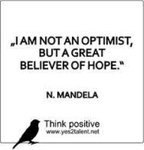You Gotta Have Hope
 Consider: In terms of your life and particularly your career, are you a person who tends to be hopeful about your future? Or do you tend more towards despair that things will not improve, no matter what you believe or do?Stay with me here—this is more than pop psychology. In my career counseling practice, I have noted that the more hopeful clients are more likely to engage in meaningful career exploration activities such as taking vocational inventories and conducting informational interviews with employed individuals in fields of interest. “High hopes,” in turn, enable these clients to crystallize new or expanded career identities and successfully pursue new employment opportunities. Not surprisingly, clients who are low on hope (unless we are successful in turning that around), are unlikely to be motivated to engage in career planning activities or ongoing career management.Similarly, recent research has indicated that highly hopeful individuals appear to achieve higher performance in their academic studies and their careers, and in general are likely to be more satisfied with their life and career (Amundson, Niles, In, Yoon, Smith & Mills). Are you beginning to appreciate why you should care about hope for positive life and career outcomes?Having hope and making it real is critically important to career change
Consider: In terms of your life and particularly your career, are you a person who tends to be hopeful about your future? Or do you tend more towards despair that things will not improve, no matter what you believe or do?Stay with me here—this is more than pop psychology. In my career counseling practice, I have noted that the more hopeful clients are more likely to engage in meaningful career exploration activities such as taking vocational inventories and conducting informational interviews with employed individuals in fields of interest. “High hopes,” in turn, enable these clients to crystallize new or expanded career identities and successfully pursue new employment opportunities. Not surprisingly, clients who are low on hope (unless we are successful in turning that around), are unlikely to be motivated to engage in career planning activities or ongoing career management.Similarly, recent research has indicated that highly hopeful individuals appear to achieve higher performance in their academic studies and their careers, and in general are likely to be more satisfied with their life and career (Amundson, Niles, In, Yoon, Smith & Mills). Are you beginning to appreciate why you should care about hope for positive life and career outcomes?Having hope and making it real is critically important to career change  and development. To begin with, it is important to understand what hope is and isn’t. It is not optimism per se, which is often the persistent belief that things will turn out well no matter what. Hope is more directly connected to the goal-directed actions one takes oneself, the belief in one’s abilities to make a difference.Now hope can also be unrealistic, overly self-serving, or not backed up by action. And, external factors like recessions or personal barriers like mental and physical health do also play a role in reaching one’s career aspirations. There’s even the caution against “false hope,” as voiced on TV by no less than Downton Abbey’s Dowager Countess: “Hope is a tease designed to prevent us from accepting reality!”Making hope real. Since I know that I am less likely to see clients in my counseling practice when their careers and lives are humming along, my job tends to be to encourage or strengthen hope when times are trying. Here are several approaches that make a difference in strengthening hope in times of planned or unplanned change:
and development. To begin with, it is important to understand what hope is and isn’t. It is not optimism per se, which is often the persistent belief that things will turn out well no matter what. Hope is more directly connected to the goal-directed actions one takes oneself, the belief in one’s abilities to make a difference.Now hope can also be unrealistic, overly self-serving, or not backed up by action. And, external factors like recessions or personal barriers like mental and physical health do also play a role in reaching one’s career aspirations. There’s even the caution against “false hope,” as voiced on TV by no less than Downton Abbey’s Dowager Countess: “Hope is a tease designed to prevent us from accepting reality!”Making hope real. Since I know that I am less likely to see clients in my counseling practice when their careers and lives are humming along, my job tends to be to encourage or strengthen hope when times are trying. Here are several approaches that make a difference in strengthening hope in times of planned or unplanned change:
- Visioning – What would you like to be different? What were your childhood or college dreams for career? What do other people say you are good at? What would awesome look like? Having and sustaining a vision keeps you focused on what you want (versus what is missing).
- Setting measurable goals. After clients tell me what they want to be different in their lives and work, I ask them to get explicit with actual goals. The best goals at fostering hope are SMART goals, because they are Specific, Measurable, Achievable, Relevant, and Time-Limited.
- Action planning. At the close of every session, I capture the various action steps we have discussed into an outline for clients. There is probably no better prescription for hope than having small steps lined out that will deliver results and build new career competencies. To encourage clients in starting small, one of my fellow career counselors points to the symbolism of her own bronzed toddler shoes on the desk—baby steps.
- Adapting. Just because a prospective employer does not reply to your email, or a desired job offer does not come through, does not necessarily mean hope was misplaced. Rather, there are often any number of unseen factors and shifting business realities that intervene: experience the disappointment and maybe ask for support, then add the insight of “expecting the unexpected” while not losing sight of your original vision.
Hope realized. Once you have a vision of the future, specific goals to aspire to, and a realistic action plan to move toward it, you will likely begin to really believe in the possibility that you can achieve it – that’s hope.I conclude with my transcendent hope for clients and readers: May you not limit your aspirations and dreams, and may hope give you the power and confidence to be more fully who you are.
